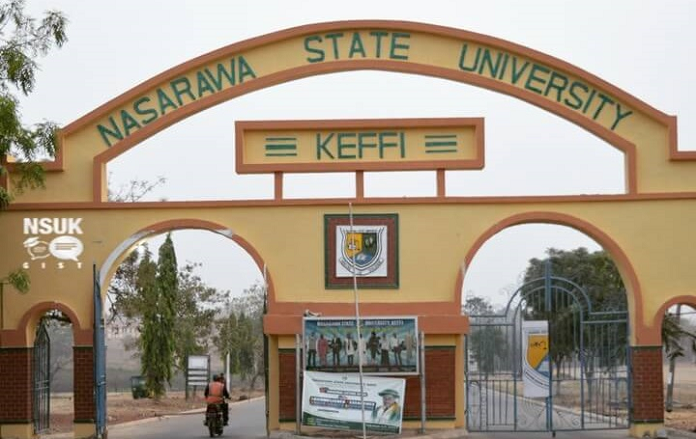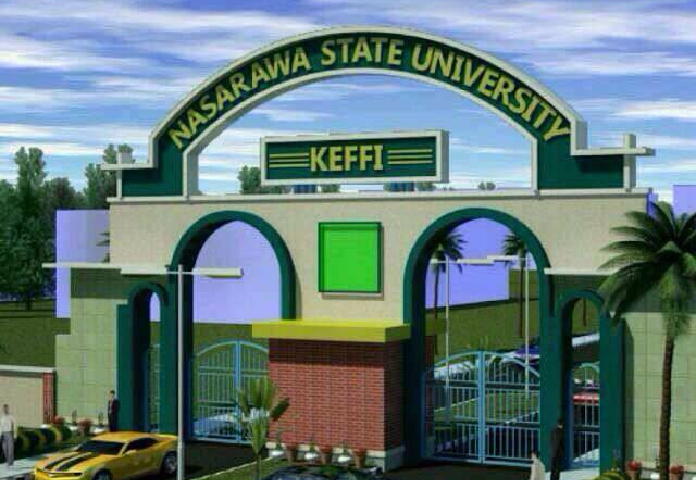Nigeria is a country with a large population. As a result, there are many institutions of higher learning at the federal and state levels. There are also many notable private universities in the country. Nasarawa State University is one of the great institutions at the state level that has contributed to educating many Nigerians. The school has produced several graduates since its inception, many of whom are notable citizens.
Located in Keffi, Nasarawa State, Nigeria, the institution started initially with two campuses; one in Keffi and one in Lafia. Keffi campus is the main campus; hence, it is widely known as Nasarawa State University, Keffi (NSUK). Later on, two more campuses were created for the university, one at Pyanku and the other at Gudi. Keffi Campus retained its status as the main campus, and it is here that the university’s administration is located.
The Keffi campus houses six faculties. A College of Medical Sciences in this campus is still in progress. The Lafia Campus houses the Faculty of Agriculture while the Pyanku Campus comprises the Faculty of Remedial Studies and the Center for Continuing Studies. Gudi Campus is to house the Faculty of Engineering, but it is yet to start functioning.
Brief History of Nasarawa State University
The institution came into existence with the Nasarawa State Law No. 2 of 2001. It was founded under the leadership of Nasarawa State’s first Democratic governor, Dr. Abdullahi Adamu. In February 2002, it was cited at the location of the non-functioning College of Arts, Science, and Technology (CAST) Keffi. Academic activities started fully in March 2002.

The Institution aims to provide a path for Nasarawa State indigenes to acquire tertiary education and to equip the graduates with the tools, skills, and knowledge needed to develop the state and the country. In addition, the university runs programs for both full-time and part-time students.
- Motto: ‘Knowledge for development’ It is an indication of the resolve of the University to provide such knowledge that would lead to the socio-economic and technological development of the state and the country as a whole.
- Vision: To be a world-class Centre of Excellence for the development of the individual and society
- Mission: The school’s mission is “To provide and promote qualitative, innovative, and stimulating teaching, learning, and research environment to enable individuals to develop their full potentials for efficient, effective, dedicated and selfless service to the State, the Nation, and Humanity.”
List of Courses One Can Study at Nasarawa State University
Nasarawa State University comprises eight faculties and many departments, grouped under the three major campuses. In addition, it has three centers; the Center for Environmental Studies (CES), the Center for Cyberspace, and the Governmental and Financial Accounting Research Center (GAFARC). Below are all the faculties and departments of this noble institution.
Faculty of Administration
The Faculty of Administration is made up of the following departments:
- Accounting
- Banking and Finance
- Business Administration
- Entrepreneurial Studies
- Public Administration
- Taxation
Faculty of Agriculture
Located in Lafia Campus, the Faculty of Agriculture is made up of these departments:
- Agricultural Economics and Extension
- Agronomy
- Animal Science
- Fisheries
- Forestry and Wildlife
- Home Science and Management
Faculty of Arts
Under the Faculty of Arts, we have the following departments and courses:
- Arabic Language
- English Language
- French Language
- History
- Linguistics
- Religious Studies
- Theatre and Cultural Studies
Faculty of Education
The Faculty of Education is a place for those that have dreams to teach. The faculty is divided into Arts and Social Science Divisions. These divisions house different departments.
Arts Division
- CRS Education
- English Education
- French Education
- History Education
- IRS Education
Social Science Division
- Economics Education
- Social Science Education
- Geography Education
Faculty of Environmental Sciences
- Architecture
- Geography
- Urban and Regional Planning
Faculty of Law
- Private and Business Law
- Public and International Law
Faculty of Natural and Applied Sciences
- Biochemistry and Molecular Biology
- Biological Sciences
- Chemistry
- Geology and Mining
- Mathematical Sciences
- Physics
Faculty of Social Sciences
- Economics
- Mass Communication
- Political Science
- Psychology
- Sociology
In addition, the university has two extra faculties: the Faculty of Remedial Studies and the Center for Continuing Studies. The Faculty of Remedial Studies is in charge of the Pre-degree program of the school. At the same time, the Center for Continuing Studies is in charge of the Post Graduate programs of the school.
Nasarawa State University School Fees
In Nasarawa State University, just like any other state university in Nigeria, fees are paid yearly, i.e., per academic session. The average amount one can expect to pay at the university is N38,000 for indigenes and N55,000 for non-indigenes. Also, as is the norm in Nigerian federal and state universities, the amount one pays per session reduces as the person goes higher in academic years. That is to say, a first-year student pays more than a second-year student, and the reduction continues until the final year. Again, some faculties and courses pay more than others, just as non-indigenes pay more than indigenes in Nasarawa State University.
Moreover, the school fee structure is published at the beginning of every session. Failure to pay the fees before its deadline attracts some fines. Here’s a breakdown of the fees according to the year of study, faculty, and indigene.
NSUK School Fees Breakdown For 2021/2022 Academic Session
Below is a breakdown of NSUK school fees for the 2021/2022 academic year for various faculties, including for indigenes and non-indigenes.
First-Year Students Indigenes (UTME)
- Faculty of Arts and Humanities: N65,100.00
- Faculty of Sciences: N68,100.00
First-year students non-indigene (UTME)
- Faculty of Arts and Humanities: N100,000.00
- Faculty of Sciences: N103,000.00
Second-year students indigenes (DE)
- Faculty of Arts and Humanities: N67,100.00
- Faculty of Sciences: N70,100.00
Second-year students non-indigenes (DE)
- Faculty of Arts and Humanities: N102,000.00
- Faculty of Sciences: N105,000.00
Second-year students indigenes (UTME)
- Faculty of Arts and Humanities: N30,600.00
- Faculty of Sciences: N32,600.00
Second-year students non-indigenes (UTME)
- Faculty of Arts and Humanities: N38,750.00
- Faculty of Sciences: N41,250.00
Third-year to Fifth-year students indigenes
- Faculty of Arts and Humanities: N26,700.00
- Faculty of Sciences: N27,700.00
Third-year to Fifth-year students non-indigenes
- Faculty of Arts and Humanities: N35,800.00
- Faculty of Sciences: N36,800.00
How To Pay Nasarawa State University School Fees
Below is a step-by-step procedure on how to go about the payment of Nasarawa State University school fees.
- Generate invoice from Nasarawa State Billing System (SBS)
- Make your payments through remita by following these steps
- go to www.remita.net
- Click on Pay TSA and States
- select Nasarawa State Government
- input the name of the school you are paying for
- select your purpose of payment
- supply the invoice number from SBS and proceed with your payment
- If you are paying with your ATM card
- select the card option
- fill the required information
- make your payment
- If you are paying through a bank
- go to the bank
- present your generated invoice with the RRR number
- make your payment
- After the payment, collect your printout/receipt generated
- Proceed to the school and submit to the bursar for the school receipt.
Nasarawa State University Admission Requirements
First Degree Minimum Entry Requirement
Candidates offered admission to Nassarawa State University are expected to fulfil the minimum entry requirements stated against the facilities into which they are admitted.
General Entry Requirement
- Five relevant credits in SSCE, SC, GCE O/L or TC II Merits or equivalent obtained at not more than two sittings (TC Merits is equivalent to O/L Credit).
- Two A/L passes plus three O/L credits in other subjects, at not more than two sittings or three A/L passes plus two O/L credits in two other subjects at not sittings; two merits, two passes at TC II plus two NCE Merits passes, including a major subject and Education.
- National or NSUK Diploma with Merit or Lower Credit grade, including at least four O/L credits in SSCE/GCE or relevant.
- Transfer candidates into classified degree programs should have a minimum CGPA of 1.50 and 2.40 for non-classified programs.
English Language Requirement
- A credit in the English Language at SSCE, GCE O/L or equivalent
- Merit in the English Language in TC II examination.
- A Pass in the HSC, A/L General Paper, English Literature, or NCE General English.
- Credit in IJMB English Language.
- A student who is admitted to a program of studies for a first degree without initially fulfilling the University’s general requirement in the English language should fulfill it before graduation.
Mathematics Requirement
- A credit in mathematics is required for all science, Social/Management Science-based courses, except where it is stated otherwise.
- Credit grade in IJMB Basic Mathematics.
Unified Tertiary Matriculation Examination (UTME) Requirement
- Applicants must write the Unified Tertiary Matriculation Examination (UTME) and attain an acceptable standard in the Use of English (compulsory) and three other subjects relevant to the proposed course of study as set out in the JAMB brochure.
- Prior to sittings for the UTME, applicants should have attained the age of sixteen (16) years or will have done so on the first day of October of the year of entry into the University.
- For a candidate, who has attained the acceptable standard in the UTME to be registered for a course in the University, he/she must, in addition, obtain one of the following qualifications:
- For admission into Arts, Business Administration, Education (Arts), Law and Social Science courses, the five subjects must include the English Language.
- Candidates applying for Agriculture, Management Science, and other science-based courses must have credit in Mathematics.
Note: A matriculated student of any University is not eligible to sit for the UTME. Those who, for economic reasons, are transferring from foreign universities could, however, write the examination.
- SSCE/GCE/O/L or equivalent with credits in five subjects relevant to the proposed course of study, and obtained at not more than two sittings.
- TC II merit passes in at least five subjects (subject to University requirement). Note that TC II is not accepted in some courses
Direct Entry Requirements
Applicants with one of the following qualifications may be considered for direct entry admission into Nassarawa State University, Keffi.
- A minimum of five subjects passed at not more than two sittings with at least two at the Principal or Advanced Level of the GCE or IJMB and others at credit level of the SSCE/GCE/O/L.
- Merit passes in two relevant major subjects (mainly for Education courses). Education may be accepted as a third A/L equivalent for those taking courses in Education.
- Two passes at the IJMB Examination or Cambridge moderated schools or Basic studies terminal examination, or international Baccalaureate from recognized institutions with Senior School Certificate Credits or equivalent in three other subjects (subject to University requirements).
Nasarawa State University Campuses
Nasarawa State University, Keffi has three (3) major campuses namely
Keffi Campus
This is the main campus and the University’s seat of administration. Situated along Akwanga-Keffi Road, Keffi, Nasarawa State, the Keffi campus has the following faculties:
- Faculty of Administration
- Faculty of Arts
- Faculty of Education
- Faculty of Law
- Faculty of Social Sciences
- Faculty of Natural and Applied Sciences
Lafia Campus
The Lafia Campus is NSUK’s Faculty of Agriculture which comprises of five (5) departments namely:
- Agricultural Economics and Extension
- Home Economics and Management
- Agronomy
- Animal Science
- Forestry, Wildlife, and Fisheries
Pyanku Campus
This is the institution’s school of remedial studies with about four (4) major course combinations.
